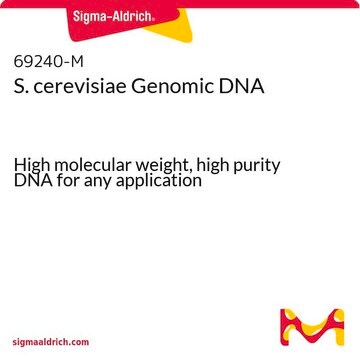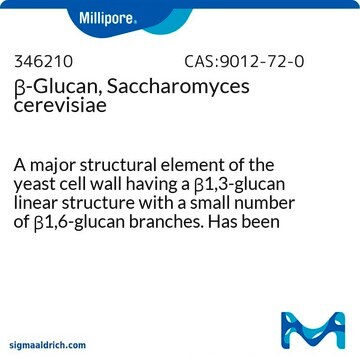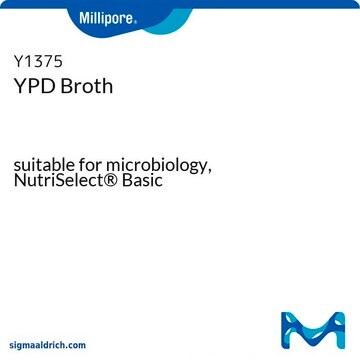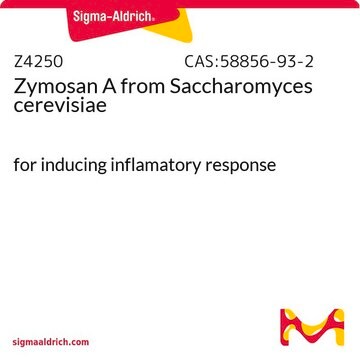This product is specifically prepared to undergo autolysis in aqueous buffer solution at 37°C, optimized for retaining enzyme activity post-drying, though not for cell viability or growth. It serves as an excellent starting point for enzyme extraction processes. For proliferation, Product YSC2 is a viable baker’s yeast, ready to grow once rehydrated, with only about 10% subject to autolysis at the same temperature. It is the preferred option for those looking to cultivate yeast effectively.
YSC1
Yeast from Saccharomyces cerevisiae
Type I
Synonyme(s) :
(Bakers yeast)
About This Item
Produits recommandés
Source biologique
Saccharomyces cerevisiae
Niveau de qualité
Type
Type I
Forme
powder or solid
Application(s)
food and beverages
microbiology
Température de stockage
2-8°C
Description générale
Application
Actions biochimiques/physiologiques
Attention
Notes préparatoires
Code de la classe de stockage
11 - Combustible Solids
Classe de danger pour l'eau (WGK)
WGK 3
Point d'éclair (°F)
Not applicable
Point d'éclair (°C)
Not applicable
Équipement de protection individuelle
Eyeshields, Gloves, type N95 (US)
Faites votre choix parmi les versions les plus récentes :
Certificats d'analyse (COA)
Vous ne trouvez pas la bonne version ?
Si vous avez besoin d'une version particulière, vous pouvez rechercher un certificat spécifique par le numéro de lot.
Déjà en possession de ce produit ?
Retrouvez la documentation relative aux produits que vous avez récemment achetés dans la Bibliothèque de documents.
Les clients ont également consulté
Protocoles
This procedure may be used for the determination of Lyticase activity using Baker’s yeast as the substrate.
-
Hi We would like to expand this yeast in our lab for an experiment. Would you please recommend best growth media for expanding this Yeast.
1 answer-
Helpful?
-
-
What are the differences between YSC1 and YSC2?
1 answer-
YSC1 is dried to prevent enzyme inactivation during enzyme extractions from yeast. On the other hand, YSC2 is fast dried and yields 90% viable cells in solid form. The primary difference lies in the method of preparation, particularly in the drying process.
Helpful?
-
Active Filters
Notre équipe de scientifiques dispose d'une expérience dans tous les secteurs de la recherche, notamment en sciences de la vie, science des matériaux, synthèse chimique, chromatographie, analyse et dans de nombreux autres domaines..
Contacter notre Service technique













